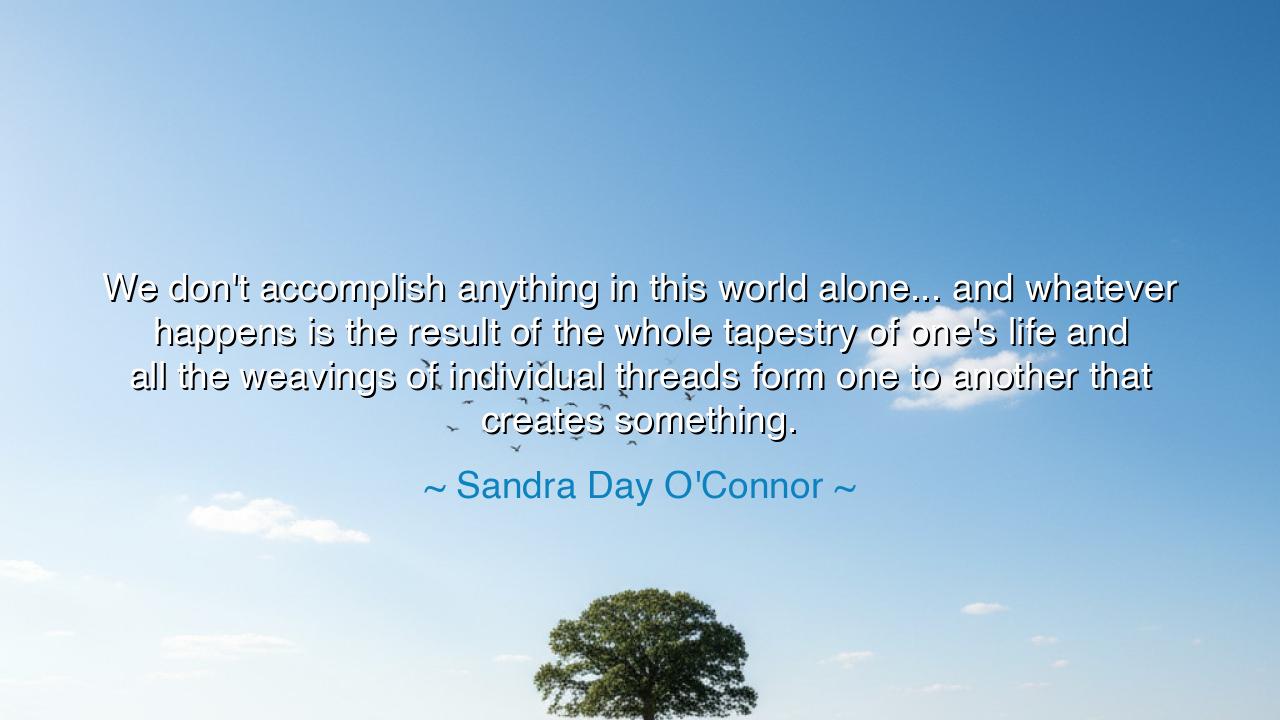
We don't accomplish anything in this world alone... and whatever
We don't accomplish anything in this world alone... and whatever happens is the result of the whole tapestry of one's life and all the weavings of individual threads form one to another that creates something.






"We don't accomplish anything in this world alone... and whatever happens is the result of the whole tapestry of one's life and all the weavings of individual threads form one to another that creates something." These words by Sandra Day O'Connor illuminate a deep and timeless truth about the interconnectedness of human existence. O'Connor speaks not merely of individual achievements, but of the greater web of life, where every action, every encounter, and every moment of struggle or triumph is woven into a larger tapestry. This tapestry is not simply the work of one thread, but the combined efforts, experiences, and contributions of countless individuals, each playing their part in creating something far greater than the sum of its parts.
At the core of O'Connor's message is the powerful idea that no one accomplishes anything alone. In a world often driven by the pursuit of personal success, it is easy to forget that our lives are shaped by the actions and decisions of others. The relationships we form, the mentors we seek, the communities we belong to—these all contribute to the fabric of our lives. Every individual thread, whether it is love, guidance, sacrifice, or support, plays a role in the larger design. We are not solitary figures, but part of a larger pattern, each of us contributing to the collective outcome of the human experience.
Consider the life of Mahatma Gandhi, whose extraordinary journey toward India's independence was not the work of a single individual, but a collective struggle. Gandhi was not merely a leader; he was the embodiment of the efforts of millions who sought freedom from colonial rule. His philosophy of nonviolence, his dedication to social justice, and his tireless activism were the results of countless influences, from his upbringing in South Africa to the ideas he absorbed from religious teachings and political thinkers. Gandhi’s success was not his alone; it was a tapestry woven from the weavings of many individual lives and the collective action of the people.
The ancients understood this interconnectedness well. Homer’s Iliad and Odyssey, for example, are not tales of isolated individuals, but of a community of warriors, gods, and mortals, all contributing to the unfolding of the story. The heroes of these epic poems, from Achilles to Odysseus, each play their part in the greater drama of fate, and their actions are deeply intertwined with the lives of those around them. In these epics, we see that no one rises alone—each character’s journey is shaped by others, and each victory or defeat ripples through the lives of many.
O'Connor’s quote calls us to recognize that success—whether in our personal lives, in our work, or in larger social movements—is never the result of one individual’s will alone. It is the culmination of a vast network of experiences, relationships, and choices. The tapestry of our lives is continually being woven, thread by thread, moment by moment. Whether it is a teacher who inspires a student, a friend who offers support, or a leader who gives direction, the individual contributions of countless people shape the outcome of every endeavor. And in this way, we are reminded that our achievements are not solely our own; they are the fruits of the shared effort of all who have touched our lives.
This recognition of interdependence leads us to an important lesson: humility and gratitude are essential virtues. To acknowledge that we are part of a larger whole, that our success is shaped by the many influences of the lives of others, is to walk humbly and to appreciate the connections that make life meaningful. It teaches us that service to others, the sharing of knowledge, and the offering of compassion are not just acts of kindness but part of the greater tapestry we are all contributing to. We must, in our own lives, seek to weave threads of goodness, justice, and kindness, understanding that the impact of our actions extends far beyond ourselves.
In practical terms, this means we must nurture relationships, seek wisdom from others, and recognize the influence we have on those around us. Our successes should be seen not as individual accomplishments, but as the result of the collective contributions of the people we encounter along our journey. By acknowledging the role others play in our lives, we foster a deeper sense of connection, compassion, and gratitude for the interconnectedness of all things. Let us not see ourselves as isolated threads, but as part of a greater, shared pattern, where each action we take, no matter how small, adds to the beauty and strength of the tapestry of life.
Thus, O'Connor’s words remind us that life is not a solitary endeavor. Every achievement, every struggle, and every lesson is part of a larger design, where each of us plays a crucial role in the collective story. Recognizing this helps us to appreciate not only our own contributions but also the contributions of others. Let us weave our lives with purpose, with a sense of community, and with the understanding that we are always, in some way, connected to those around us. And in doing so, we will find that we are not alone in our journey, but part of the greater fabric of human experience.






AAdministratorAdministrator
Welcome, honored guests. Please leave a comment, we will respond soon